Semantic Web-Based Information Systems: State-of-the-Art ...
Semantic Web-Based Information Systems: State-of-the-Art ...
Semantic Web-Based Information Systems: State-of-the-Art ...
You also want an ePaper? Increase the reach of your titles
YUMPU automatically turns print PDFs into web optimized ePapers that Google loves.
Semant cs for <strong>the</strong> Semant c <strong>Web</strong><br />
reasoning, which was <strong>the</strong> bane <strong>of</strong> description logics. Although a favorable trade-<strong>of</strong>f<br />
between computational complexity and expressive power has been achieved, <strong>the</strong>re<br />
is still <strong>the</strong> fundamental issue <strong>of</strong> <strong>the</strong> inability <strong>of</strong> DLs to allow for representation <strong>of</strong><br />
fuzzy and probabilistic knowledge.<br />
Powerful.(S<strong>of</strong>t).<strong>Semantic</strong>s<br />
The statistical analysis <strong>of</strong> data allows <strong>the</strong> exploration <strong>of</strong> relationships that are not<br />
explicitly stated. Statistical techniques give us great insight into a corpus <strong>of</strong> documents<br />
or a large collection <strong>of</strong> data in general, when a program exists that can actually<br />
“pose <strong>the</strong> right questions to <strong>the</strong> data,” that is, analyze <strong>the</strong> data according to our<br />
needs. All derived relationships are statistical in nature, and we only have an idea<br />
or a likelihood <strong>of</strong> <strong>the</strong>ir validity.<br />
The above-mentioned formal knowledge representation techniques give us certainty<br />
that <strong>the</strong> derived knowledge is correct, provided <strong>the</strong> explicitly stated knowledge was<br />
correct in <strong>the</strong> first place. Deduction is truth preserving. Ano<strong>the</strong>r positive aspect <strong>of</strong><br />
a formal representation is its universal usability. Every system that adheres to a<br />
certain representation <strong>of</strong> knowledge will understand, and a well-founded formal<br />
semantics guarantees that <strong>the</strong> expressed statements are interpreted <strong>the</strong> same way<br />
on every system. The restriction <strong>of</strong> expressiveness to a subset <strong>of</strong> FOL also allows<br />
<strong>the</strong> system to verify <strong>the</strong> consistency <strong>of</strong> its knowledge.<br />
But here also lies <strong>the</strong> crux <strong>of</strong> this approach. Even though it is desirable to have a<br />
consistent knowledge base, it becomes impractical as <strong>the</strong> size <strong>of</strong> <strong>the</strong> knowledge base<br />
increases or as knowledge from many sources is added. It is rare that human experts<br />
in most scientific domains have a full and complete agreement. In <strong>the</strong>se cases it<br />
becomes more desirable that <strong>the</strong> system can deal with inconsistencies.<br />
Sometimes it is useful to look at a knowledge base as a map. This map can be partitioned<br />
according to different criteria, for example, <strong>the</strong> source <strong>of</strong> <strong>the</strong> facts or <strong>the</strong>ir<br />
domain. While on such a map <strong>the</strong> knowledge is usually locally consistent, it is almost<br />
impossible and practically infeasible to maintain a global consistency. Experience<br />
in developing <strong>the</strong> Cyc ontology demonstrated this challenge. Hence, a system must<br />
be able to identify sources <strong>of</strong> inconsistency and deal with contradicting statements<br />
in such a way that it can still produce derivations that are reliable.<br />
In <strong>the</strong> traditional bivalent-logic-based formalisms, we — that is, <strong>the</strong> users or <strong>the</strong><br />
systems — have to make a decision. Once two contradictory statements are identified,<br />
one has to be chosen as <strong>the</strong> right one. While this is possible in domains that are<br />
axiomatized, fully explored, or in which statements are true by definition, it is not<br />
possible for most scientific domains. In <strong>the</strong> life sciences, for instance, hypo<strong>the</strong>ses<br />
have to be evaluated, contradicting statements have promoting data, and so forth.<br />
Decisions have to be deferred until enough data is available that ei<strong>the</strong>r verifies or<br />
Copyright © 2007, Idea Group Inc. Copying or distributing in print or electronic forms without written permission<br />
<strong>of</strong> Idea Group Inc. is prohibited.


